Brian Niemeier's Blog: Kairos - by Brian Niemeier, page 2
January 6, 2025
Generation Z White Pills

For a white pill about Generation Z, I went back and dug up some data pointing to encouraging trends among Zoomers.
Look closely at this chart by Audacious Epigone. Pay particular attention to the generational trends in attitudes toward pornography.
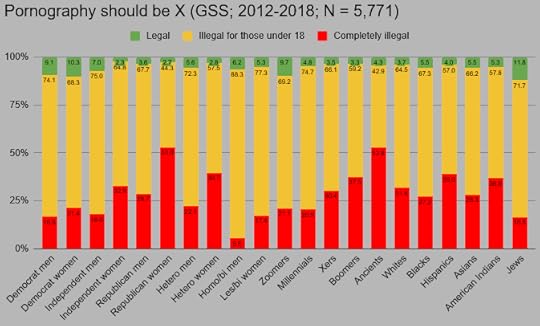
"This is terrible!" you may say. "More Zoomers want porn to stay legal than any other generation polled!"
But on closer inspection, a couple of remarkable data points stand out:
More Zoomers than Millennials want porn banned outright.
This stat marks a reversal in the trend that started with the Boomers of each successive generation favoring porn bans less than the last.
Perhaps most fascinating is how split Zoomers are on the porn question--more than any prior cohort. Factor in people's reliable tendency to grow more conservative with age and the high likelihood that many pro-porn Gen Zeds are having their freshman fling with Libertarianism, and odds are good that their green bar will shrink to the red bar's benefit.
Lest you still doubt the Zoomers' budding reactionary streak, take a look at another AE chart, this time on gun laws.
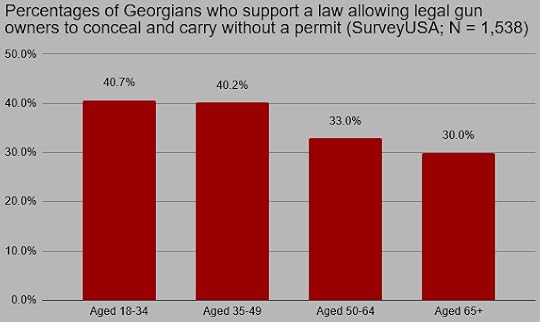
Note that the age categories above lump Gen Zeds in with some Millennials. It's a good bet that support for C&C is even higher among 16-20 year-olds.
Now, a common mistake older folks make is to impose their Left vs Right filter on groups that eschew that paradigm. By and large, Zoomers who reject the Death Cult's vision are ambivalent or even hostile toward Classical Liberalism, unrestricted free marketism, and government noninterventionism. The see those 20th century ideologies as failed pipe dreams that have no relevance in the post-Western world they've been relegated to.
What does interest Zoomers on our side is the family and faith life their grandparents took for granted and they themselves never had.
I can hear the objection. "But Zoomers are the most irreligious generation ever!"
Allow me to cast glimmers of hope on that dire pronouncement.
First, in terms of religiosity, Zoomers are tied with Millennials.
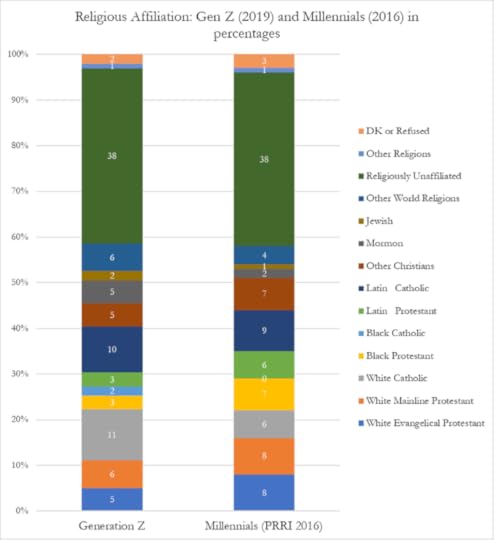
Just as the decades-long trend toward greater acceptance of pornography stopped with the Gen Z, the Zoomers have also arrested the decline in religious practice. The fact that Zoomers aren't less religious than Millennials, in spite of how they were raised, qualifies as a minor miracle.
And those numbers are a couple years old. They don't take into account the rising interest in religion due to Covid.
Nor do they show people's general tendency to become more religious with age. Consider that Zoomers as a group are much more religious than the Boomers were at their age.
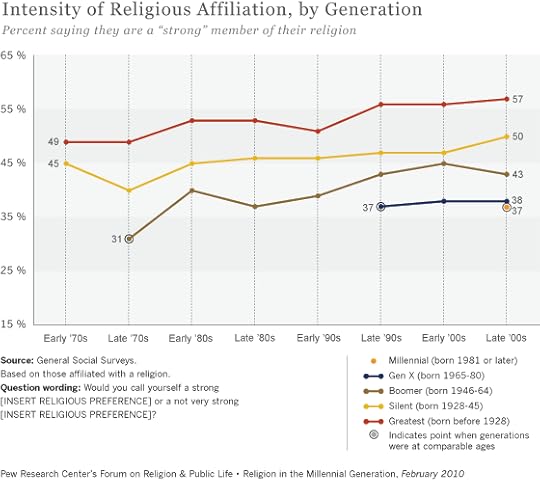
And yes, I know that chart doesn't mention Gen Z by name. It does lump them in with Gen Y and the Millennials. But as we've seen, religiosity among those cohorts is pretty much the same at present. Given that piety among all generations trends upward over time, and factoring in the severe hardships that are almost certainly around the corner, we can expect Zoomers to surpass the Boomers as they navigate the Clown World hellscape.
No more Gen Z blackpilling. Our duty is to guide them through the spiritual minefield we've made, and that means leading them into deeper relationship with Jesus Christ.
For a glimpse at a post-future where most people take religion seriously, check out my thrilling mech saga Combat Frame XSeed.

January 4, 2025
The eDrama Egg Timer

Chief among the challenges faced by counterculture artists is the problem of discoverability. If you're a talented creator whose personal convictions make you anathema to the fanatics that run the media, how are you to build an audience?
One answer our guys have come up with is eDrama marketing. The basic idea is to pick out a representative of the establishment and find a way to sell yourself as the plucky little guy crusading against the man. People - especially Americans - love an underdog, so playing the put-upon victim of megacorp ticket-takers is an effective way to drum up sympathy.
No doubt about it, eDrama can make for rapid gains. I've used that approach myself. If the popularity of professional wrestling has taught us anything, it's that kayfabe works. People love to root for the face against the heel. The ringleaders of certain dissident art scenes have ridden outrage marketing to modest e-celebrity and small fortunes.
Now, stirring the pot can be an effective way for a newcomer to get visibility. Most people reading this post can think of multiple now-established brands that made their bones by feuding with the big boys when they first hit the scene. The problems inherent in eDrama marketing come to the fore when creators let outrage tactics drag on too long. That way risks developing a dependency on ginning up outrage. Astute observers will note the baked-in weakness of that approach: If the growth of your brand relies on picking fights with the man, you always need to be punching up against bigger and bigger fish. The fate awaiting those who choose this path is inevitable defeat by their own success, as they in turn become the man. After that, there's nowhere to punch but down.
On the other hand, a rabble-rousing artist could in theory grow his brand to a comfortable level and carve out a niche there. But then he runs into the problem of diminishing returns. Maintaining a given level of notoriety in the outrage game means jousting with the same set of moderately bigger brands ad infinitum. Since you can't let your efforts make too big a splash, you've got to trade constant mid-level coups for intermittent big ones. Time spent tilting at online foes cuts into more profitable activities like drawing, writing, or composing. In practice, nobody can keep up that level of drama forever, so taking this route is a ticket to burnout.
Either way, following the eDrama road past the initial breakout phase sets an egg timer on your career. The countdown to irrelevance has begun.
The same goes for attacking big IPs as opposed to personal brands. Posting essays and making videos about how the latest installment of Big Brand X is woke garbage still boils down to riding Brand X's coattails, no matter how thoroughly you DESTROY its lame characters and hackneyed plot.
Again, if you decide to continue with this approach beyond a certain point, you'd better hope Big Brand X never falls out of favor, because your gravy train will go with it. For counterculture artists, building a brand off of attacking globomedia franchises is no less a setup for failure than the GOP running against the Democrats. By defining your brand as anti-Brand X, all you're doing is signing with the Globetrotters.
Which works if all you're in this for is to make enough scratch to stave off a day job. Readers who've been watching the indie arts scene for the last few years could name a number of creators who are now making a living as social media firebrands or YouTube critics.
The elephant in the room, though, is that everyone outside the velvet rope makes obligatory noises about changing the culture. As has been explained, waging flame wars with oldpub purse puppies and giving Hollywood studios free advertising disguised as poison pen reviews does exactly nothing in the long run to accomplish that goal.
George Lucas didn't make Star Wars a household name by attacking Flash Gordon.
J.K. Rowling didn't turn Harry Potter into an international sensation by sniping at George R.R. Martin.
You could say that the socioeconomic conditions that enabled Lucas' and Rowling's success no longer exist, and you'd be right. That doesn't mean other avenues aren't available and more won't become available with time.
Here's a simple and relatable story about a guy who got a successful side business up and running by selling pineapple-themed products. Starting from where a lot of you are now, he did his market research, found his niche, and made sure people associated positive shopping experiences with his easily identifiable brand.
Anybody in any market can do the same. How?
I'll answer with another question:
Who makes your water heater?
Chances are, unless you just bought or renovated your home, you didn't know the answer off the top of your head. That's no slight against water heaters or their manufacturers. Both are rather low-profile because water heaters are expected to be reliable. We only interact with them on the rare occasions when they don't work.
Follow up question: What brand of TV do you have?
Bet you knew that one right away, didn't you? That's because, unlike your water heater, you interact with your TV all the time. And every time you do, you see the manufacturer's logo emblazoned right there on the front.
Which is entirely deliberate, by the way. Watching TV gives you a dopamine rush. TV manufacturers strategically place their logos so you'll associate their brand with your dopamine hits.
How do you build a brand that actually has a chance of making a cultural impact?
Be the TV.
That means consistently giving customers positive experiences and making sure they associate those experiences with your brand.
January 3, 2025
Aughts Nostalgia

The accepted wisdom among creators in the new counterculture holds that there will be no aughts nostalgia movement as there is for the last decades of the 20th century.
Western cultural development stagnated and finally started eating itself circa 1997. Therefore, the lion's share of media products after that point are necessarily debasements or hollow derivatives of 80s and 90s IPs.
Nevertheless, this week I came across a Millennial attempting to stir up nostalgia for post-Ground Zero culture.
Here's the best he could come up with:
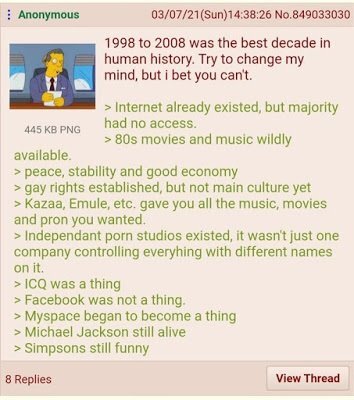
You might ask how I know the anon who authored that greentext is a Millennial. Besides the time window he picked, which would have coincided with Millennials' childhood and adolescent years, he displays that generation's defining attitudes toward the past. That being marked ignorance of and glib disdain for history compounded with delight in seeing what came before them destroyed.
Let's go down the list:
Normie-free internet - Clearly he never saw MySpace. The real golden age of the internet as exclusive nerd social club was the 90s. But narcissists dislike contemplating the world before they existed.
80s nostalgia - is 80s nostalgia, not aughts nostalgia, but he has to reframe pop culture icons predating his birth in terms of their Reboot Phase.
World Peace and economic stability: Here's the dead giveaway. The decade this anon cites coincides with the War on Terror. He has no memory of the world before the Forever Wars, so he takes the current state of low-grade global chaos as his baseline. This point perfectly demonstrates why lumping Generation Y in with the Millennials produces a useless generational model.
Poz, just not as much - Note that anon approves of the nuclear family's demolition; he just preferred it when the wrecking ball hadn't yet been turned on his video games.
Piracy and porn - Here's a glimpse at the deep evil festering beneath Millennial's worldview. Petty theft and onanism are not culture. They are infections that sterilize the self-propagating faculty that is a major defining mark of culture. You're seeing the greased slide that leads straight from the Pop Cult to the Death Cult, folks.
More porn - this guy is so blinkered and conditioned not to think past his own crotch that he can't see how the degeneracy he pines for ruined everything else he loves.
ICQ - invented in 1996
Facebook as we know it didn't exist in the 80s, either.
OK, he has been on MySpace. If he considers that the high point of internet culture, he's suffering from far more severe historical ignorance than I thought.
Michael Jackson - yet more co-opted 80s nostalgia
The Simpsons - had stopped being funny by 1998, and it's been scientifically proven.
The bleak self-portrait painted by Millennial Anon's greentext shows an atomized, solipsistic child forever looping in the Corporate IP Death Cycle with no idea where he came from or where he's going.
But anon and countless Millennials like him are not to be scorned. Rather, they are to be pitied. Generations Y, X, Jones, and the Boomers helped make and perpetuate the spiritual wasteland to which younger generations have been condemned. It's incumbent upon us to do what we can to salvage them.
What concrete action have you taken today to rebuild authentic culture?
If you can't come up with anything, my first suggestion is to take a minute and pray for guidance.
Then, take stock of your skills and resources to figure out positive steps you can take in your corner of the world to support the flourishing of healthy culture.
January 2, 2025
Orb-Pondering Follow Up

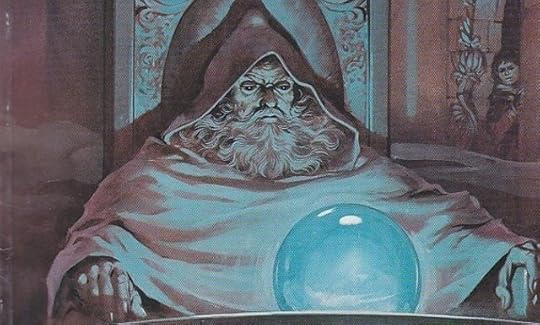
To be honest, I’d forgotten about even having made predictions for 2024 last year. But a quick search turned up that, yes indeed, my idle orb-ponderings were in fact posted exactly one year ago today.
Fair enough. I made the calls. Now the time has come to see just how accurate they were.
Testing the accuracy of each prediction in the order I made them …
Pope Francis’ Health Worsens
But to the frustration of MadTrads online, the Supreme Pontiff will hang on despite intensifying medical woes. Perceiving their window of opportunity closing, the subversive elements within the Church’s hierarchy will attempt to ram through a magisterial document that advances their agenda.
They will succeed – partly – in passing the kind of reversal the fake news media and Catholic Twitter thought Fiducia supplicans was. However, the dimming of their intellects due to sin will provide a resolution to the crisis. The turgid Church-Speak in which it will be written will make the document unintelligible, unenforceable, self-contradictory, or all three. These deficiencies will be compounded by the fact multiple older and higher magisterial decrees overrule it, making the new doc null and void.
Look for this doctrinal mess to pivot away from the gay stuff, which flopped last year, for yet another attempt to get a foot in the door on the women’s ordination front. As others have observed, no one has cared much about the womynpriest – AKA cosplaying witch – issue since the 70s. But with a dwindling yet still powerful contingent of the hierarchy still stuck in that decade, look for them to approve “deaconesses” or some such anachronism.
Folks like Bishop Barron and Jimmy Akin will clarify that the expanded liturgical role for women is a lay ministry separate from Holy Orders. They will be right, but high-profile sacramental abuses will happen anyway. Most bishops will just ignore the document’s guidelines, and life in most parishes will go on.
Result: Pretty spot-on, if I do say so myself. It is a sad fact that the Holy Father’s health has indeed declined over the past year, and we should all keep him in our prayers. An uproar did break out from the usual suspects about some ecclesial funny business - and the subject was women’s ordination, as expected. In a happy turn of events, this prediction’s only demerit was giving the pro-witch lobby too much credit. While they tried their best at the synod, all that could be managed was yet another FDS outbreak due to yet another misrepresented off-the-cuff remark by Pope Francis. So, all told, business as usual.
The Housing Crisis Gets Better
Rents and home prices will finally trend downward in the first quarter of this year. Millennials who’ve been clawing to get into the housing market will get some relief. But heartless megacorps like Black Rock will take advantage of the better rates to swoop in and scoop up even more once-privately owned land.
Because in the words of Lex Luthor’s dad, “It’s the one thing they’re not making any more of.”
Again, I’m crediting myself with more than moderate accuracy on this one, as well. Year-on-year housing prices did go down 3.5% in the fourth quarter of 2024. Anecdotally, I know at least one person who was able to snatch up a decent home at that time for a steal. But, the caveat to my prediction also materialized, as average home prices for the year ended up at +3.4%. So Millennials will have to keep waiting for that milestone.
The GOP Keeps Control of Congress
Congress’ job approval ratings may be at historic lows , but if the past few years have taught us anything, it’s that public opinion doesn’t matter in a democracy.
After blowing what should have been a red wave election by their obstinate refusal to give their voters what they want, the GOP was left clinging to a congressional majority by its fingernails. Despite lurching from one politcal disgrace to another, Republicans will keep or increase their control of the legislature this November.
How? Simple math, for the most part. Constituents win reelection close to 90% of the time. This year, about twice as many Democrat lawmakers are retiring as Republicans. Many of those seats are expected to flip, which should drag the GOP across the goal line.
If you want to get even more cynical, those who follow the Global American Empire’s foreign meddling warn that the war machine has been put in standby mode till after the elections. Since the GOP’s main role in the two-faction ruling class is to be the War Party, expect them to consolidate their majority so they can bomb some goat country on behalf of the powers that be.
Yeah, gold star on that one. Not that predicting it took Nostradamus-level foresight.
And the grand total is 3 out of 3 for New Years’ predictions I forgot I made. I’m as nonplussed as you, to be frank.
Anyway, I’m curious about what you guys think is in store for us in 2025. Post your predictions below.
January 1, 2025
Hope for Gen Y


Ys are the gaslighted generation. Boomers taught them a false vision of the world but failed to teach them practical skills. As a result, Ys tend to have difficulty dealing with the real world and often have a “mugged by reality” experience–which happens to Cher in a literal sense.
As for dealing with these deficiencies, it’s vital to remember that failure is normal. Ys tend to fear failure and get easily discouraged because they were taught to avoid conflict instead of facing it.
Like all bad habits, overcoming counterproductive Gen Y behavior patterns takes work. Luckily, the internet makes it easier. Don’t know how to cook a meal, balance a checkbook, or change a tire? A world of knowledge is just a click away.
TL; DR: It’s a technical problem that admits of technical solutions.
I did some research on Strauss and Howe’s Fourth Turning generational theory. In a nutshell, they assert that generations come in cycles of four archetypes corresponding to four repeating historical turning points.
A cultural High fosters a Prophet (Idealist) generation.
An Awakening brings about a Nomad (Reactive) generation.
An Unraveling gives rise to a Hero (Civic) generation.
A Crisis brings forth an Artist (Adaptive) generation.
Strauss and Howe start our current cycle with the Baby Boomers as the Prophet-Idealist generation that entered childhood during the postwar cultural High.
Bull’s-eye.
However, they immediately veer off course by labeling Generation X, the Millennial, and Generation Z as Nomad-Reactive, Hero-Civic, and Artist-Adaptive cohorts, respectively.
Strauss and Howe’s mistake is easy to see. While they correctly define their generational archetypes based on shared formative experience:
They say the generations in each archetype not only share a similar age-location in history, they also share some basic attitudes towards family, risk, culture and values, and civic engagement. In essence, generations shaped by similar early-life experiences develop similar collective personas and follow similar life-trajectories.
They erroneously stick to an arbitrary definition of a generation as a twenty-year period.
As I’ve argued previously, the Awakening sparked by the Boomers has led to such a rapidly accelerating societal Unraveling that people born just twenty years apart no longer have anything close to the same formative experiences. Shortening the duration of each turning after the Boomer High corrects the problem.
This correction also gives us ten extra years between the Boomers and the X-ers into which Generation Jones fits snugly, plus ten more between the Xers and Millennials perfectly sized for Generation Y.
Making these adjustments gives us:
High: The Baby Boomers: Prophet-Idealist
Awakening: Generation Jones: Nomad-Reactive
Unraveling: Generation X: Hero-Civic
Crisis: Generation Y: Artist-Adaptive
See Strauss and Howe’s description of an Artist generation:
Artist (Adaptive) generations enter childhood after an Unraveling, during a Crisis, a time when great dangers cut down social and political complexity in favor of public consensus, aggressive institutions, and an ethic of personal sacrifice. Artists grow up overprotected by adults preoccupied with the Crisis, come of age as the socialized and conformist young adults of a post-Crisis world, break out as process-oriented midlife leaders during an Awakening, and age into thoughtful post-Awakening elders
The generation that entered childhood with the threat of nuclear annihilation hanging over their heads, grew up during a brief return to conformity and consensus in the Reagan and Bush years, were propagandized by the converged post-1980 entertainment industry, had overprotective parents, and grew into adults looking to go along to get along has been well documented on this blog.
Their name rhymes with, “Why?”
Now, there’s a fair objection to be made to my modification of Strauss and Howe’s theory. My X-er readers have probably spotted it, but for everyone else, here’s the Fourth Turning definition of a Hero generation:
Hero (Civic) generations enter childhood after an Awakening, during an Unraveling, a time of individual pragmatism, self-reliance, and laissez-faire. Heroes grow up as increasingly protected post-Awakening children, come of age as team-oriented young optimists during a Crisis, emerge as energetic, overly-confident midlifers, and age into politically powerful elders attacked by another Awakening.
Members of Generation X will probably nod along to the first sentence of that definition. They grew up post-Sexual Revolution in the rugged individualist early 80s. Where the wheels come off is at the “increasingly protected” part. Gen X is notorious as the “Thrown to the wolves” generation.
As a result, they’ve hardly come of age as overconfident team players. And we know Gen X will never be given the reins of political power. They and Gen Y will be skipped over.
What could possibly have gone wrong? How did a cycle of each generation passing the torch to the next suddenly get derailed after working smoothly for hundreds of years?
I wonder.

Before discounting my variation on Strauss and Howe’s theory, keep in mind that they originally listed the Millennials as a Hero generation. Others have argued that this classification is accurate, but the Millennials’ heroic destiny has been thwarted.
I argue that the evidence much more strongly points toward the X-ers as the Hero generation whose collective vocation was ruined by their parents’ failure.
The anomaly which explains all subsequent aberrations in the Four Turnings theory is that no prior generation in recorded history actively hated their own children–until the Baby Boomers.
Think that’s hyperbole? Keep in mind that the Boomers murdered half of their children in the womb.
Sincere condolences, Gen X. You were supposed to be the heroes we needed. But like hack authors who purposefully subvert the hero of prophecy in their postmodern Tolkien ripoff novel, the Boomers’ neglect and abuse killed your optimism and patriotism. Along with half of you.
The bad news is that our civilization probably won’t survive the damage inflicted by Generation Locust. Strauss and Howe didn’t find anything like the Boomers going all the way back to the fifteenth century. There probably hasn’t been such a destroyer generation since the fall of Rome.
In the title of this post, I held out hope–specifically for Generation Y. Now that we’ve correctly identified Gen Y as an Artist-Adaptive generation, we have a glimpse of what the future may hold for them.
Strauss and Howe have chronicled past Artist generations breaking out of their shells in middle age to master useful processes and take leadership positions. That’s an encouraging prospect.
But the tragic tale of Gen X warrants a big caveat. It’s highly unlikely that Ys will get to fill official leadership positions. Those are reserved for the Millennials. If Ys are going to emerge as leaders, it will be as local, informal organizers and mentors.
Of course, it’s possible that the Boomers permanently sabotaged Gen Y as well. But the key formative difference between Gen X and Gen Y also Gives Ys reason to hope.
Gen X’s Hero archetype was broken because they didn’t get the necessary protection from their parents. In contrast, the Boomers overcompensated with their younger Gen Y children, enabling them to fulfill their Artist archetype.
The question remains: Will Gen Y fulfill the Adaptive part of the equation? Based on signs we’re seeing now, the answer could be yes. Many authors among the PulpRev and Superversive literary movements belong to Generation Y. They’re not only establishing themselves as skilled artists, they’re actively seeking to inspire cultural change.
The greatest obstacle Gen Y will have to overcome is their lack of confidence and practical skill. To fulfill their role of guiding Gen Z, they must embrace failure as a trusted teacher and put in the work to master the life skills they were never taught. And like Roosh, they must return to Christ.
December 31, 2024
Marketing Millennials


A comment by author JD Cowan demonstrates the deliberate memory holing of Generation Y in this article from 2001.
Here at the turn of the real millennium, trend forecasters and futurists are pondering new ways of cross-marketing to all of America's biggest consumer groups. First there was the generation of World War II GIs--part of Mr. Brokaw's The Greatest Generation--followed by the Silent Generation and their kids, the Baby Boomers--the group that cemented generational targeting as a discipline.
Then came Generations X and Y, and now there's the "Millennial" generation.
There you have it--generations X, Y, and the Millennials all acknowledged as separate cohorts. That was the accepted model until Madison Avenue Boomers revised history, but we're getting ahead of ourselves.
They also skipped Generation Jones, but what else is new?
In the past, generations were defined largely by the year in which one was born. Now target marketing has reached the point where generational attitudes are discerned and used as a starting point for media planning.
Like I've been saying for a while now, classifying generations by twenty-year intervals is arbitrary line drawing in an era of rapidly accelerating societal change.
In other words, it makes no sense to call someone who grew up with neither internet nor smart phones but who remembers the Cold War a part of the same generation as someone whose entire life span parallels that of The Simpsons.
"Generation Y was a [popular phrase] in 1993, a term which at that point identified correctly the last third of Gen X," Mr. Strauss said. "The notion has become familiar in popular culture and in marketing to refer to teenagers. But now Y is a little older-those marketing styles are either directed at current young twenty-somethings or they're applying the veneer of X to a short-lived effort to reach teenagers that is not going to work over time." Understanding the new generation as its own animal is key to reaching its members successfully, Mr. Strauss said.
Defining the Millennials as the generation born in or after 1982, Mr. Strauss calls them more numerous, more affluent, better educated and more ethnically diverse than generations past. Millennials also have been trained to be "doers" and "achievers."
"The GI's were the first great generation," said Mr. Strauss. "We now need a new `greatest generation'-one that's responsible and civic-minded. The shoes are there for them to fill. It's harder to become more cynical than the boomers, or more sarcastic than the Xers. The kids aren't going to go linearly from what adults are doing; historically, they never have."
Thus proving a) that Generation Y is a real cohort which differs significantly from the Millennials, b) that the former term was cynically phased out by marketers, and c) how clueless most people in marketing are.
To hear me discuss Generation Y in more detail, listen to my appearance on The Front Porch Show.
If that piques your interest, read my #1 best seller:

December 30, 2024
Lost Generations


Identity politics has increasingly become a hot-button issue. The debate typically centers around matters of ethnicity or religion, but an often overlooked yet just as important factor in setting a person's self-concept is generational identification.
Inter-generational conflict has become so ingrained in contemporary culture that it's hard to imagine a time when people didn't wear their generation as a badge in the political struggles and culture wars that are coming to a head today. But for members of one generation to bring their cohort-specific grievances into the sociopolitical arena as a plank against other entire generations is a relatively recent development that really only goes back to the 1960s.
You had disputes between elders and their offspring before, to be sure, but there had never been anything like the wholesale rebellion of the then-young against all the received wisdom, culture, and traditions of their parents that the West saw in the late 60s.
The generation that won the culture war and is now firmly entrenched in the halls of power, the Baby Boomers, have a general tendency to project their own peculiar attitudes and perceptions onto other generations en masse. They also run Hollywood, academia, and the media, so you get constant color commentary about nihilistic Gen Xers, Millennial snowflakes, and the stodgy, repressive Greatest Generation--who've become noble and heroic now that they've given the Boomers all their stuff.
Another curious phenomenon arising from the current obsession with age-based demographics is the cycle wherein a generational label will be defined and bandied about in the public discourse for a few years before the term is retired and the people it once described are lumped in with another generation--usually alternating between the preceding and succeeding cohorts, depending on the commentator.
Do you remember--or belong to--any of these lost generations?
The Silent Generation: too young to fight in WWII, they served in Korea and made most of the contributions to art, politics, and culture that the Baby Boomers identify with. For example, all of the Beatles were actually Silents.
Generation Jones: the younger siblings of the Boomers and the older siblings of Generation X. Jonesers' defining life experience is the nagging sense of having shown up just a little too late for the banquet that the Greats set for the Boomers. The members of U2 belong to the Jones generation.
Generation Y: younger siblings of the Xers and older siblings of Millennials. The last generation to have personal memories of the Cold War and the pre-internet age. Taylor Swift is at the tail end of Gen-Y.
The current tendency is to throw the Silents in with the Greats or the Boomers, meld the Jonesers with the Boomers or the Xers, and blur the lines between Gen-Y and the Xers and Millennials. But in terms of formative experiences, typical self-identification, and existing generational terminology, this muddying of the waters makes no sense.
Prime example: describing the current crop of youngsters as Generation Z makes no sense without a Generation Y.
To resolve this issue, I did a bit of demographic research. It occurred to me that the old standard definition of a generation lasting twenty years is less relevant considering the rapidly accelerating pace of cultural change. The last generation that this time scale works for is the Greats. After them, I found that categorizing the population by generational cohorts spanning ten years instead of twenty better described the average member of each category.
I based the following generational categories and timetables on likely formative experience, common cultural touchstones, likely parentage, and the general state of the culture when each cohort came of age.
The Greatest Generation: 1914-1934
The Silent Generation: 1935-1945
The Baby Boomers: 1946-1956
Generation Jones: 1957-1967
Generation X: 1968-1978
Generation Y: 1979-1989
The Millennials: 1990-2000
Generation Z: 2001-2011
By this reckoning, the Boomers are the children of the Greats. The Jonesers are, by and large, the Silents' offspring, Xers are the children of the Boomers, Generation Jones begat Gen-Y, Gen-X spawned the Millennials, and Gen-Y birthed Gen-Z.
Food for thought.

December 24, 2024
Big News: A New Site for the New Year

Happy Christmas Eve to all our faithful readers. We’ve been blessed with major growth over the past few years, and now we’ve outgrown our second web site. So, to keep up with the needs of our booming business and growing readership, we’re moving to a whole new site. The new home of Kairos is already up and 80 percent ready. And we’re confident you’ll find it an even more user-friendly experience.
December 20, 2024
Burned Book Christmas Sale

Special Announcement: We are migrating Kairos to a new and improved web site. The transfer may cause some site interruptions over the next week or two, and we appreciate you bearing with us as we work to improve your reading experience.
December 19, 2024
Why Books Are More Than Books: The Power of Intellectual Property

A valued patron recently pointed me toward a video by a YouTuber called the Nerdy Novelist. He’s been in the newpub scene for the better part of a decade now and frequently rubs elbows with some of the bigger players. According to him, the advent of A.I. is forcing authors to reconsider the value of their work. As the tools for creating written words spread like wildfire…
Kairos - by Brian Niemeier
- Brian Niemeier's profile
- 56 followers



